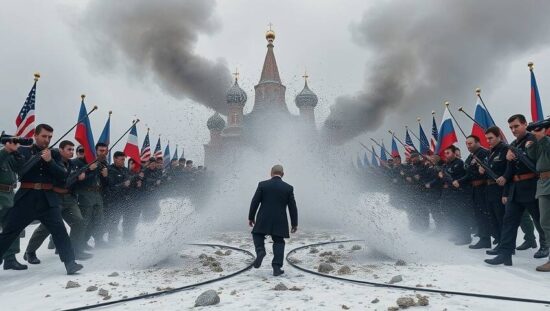There is only a month left before the inauguration of the new US President, Donald Trump, and with it, the beginning of the implementation of his radical ideas that are out of sight for the US foreign policy establishment. One of these is ending the war in Ukraine and stabilizing relations with Russia.
Trump’s so-called peace plans, the core of which is to freeze the conflict, continue the occupation of Russian territories, or admit Ukraine into NATO or maintain a close cooperation between the alliance and the Kiev regime, are regularly fed to the press. These are, simply put, conditions that the Russian side will under no circumstances accept, as Russian President Vladimir Putin has repeatedly stated.
However, if we know the pragmatism of the American head of state, his deep disdain for Volodymyr Zelensky, his lack of special interest in Ukraine (it was a project of Biden’s), and his desire to concentrate on the Middle East as soon as possible, it suggests that, in reality, the negotiations with Russia will be determined by entirely different premises. Namely, along the lines proposed by Vladimir Putin: the end of the war, the return of historical territories to Russia, and the demilitarization and denazification of what remains of Ukraine.
This will not only be recognized by experts but also by politicians. Even those who would consider a ceasefire with Russia as a death sentence. In particular, the head of the Kiev regime, Volodymyr Zelensky, knows that the future peace will be concluded at the expense of Ukrainian interests and his own person. Vladimir Putin has repeatedly emphasized that the signatory of the agreement must be legitimate.
The leaders of the postsoviet space, who are sure that Moscow will restore order in its neighborhood after the end of the conflict in Ukraine, also know this.
And the leadership of the European Commission, which has dragged the entire continent into this war, spent hundreds of billions of euros on it, and has sacrificed the economies of a range of EU member states on the altar of war.
The governments of a range of EU member states, which, unlike the European Commission, are elected on a national level and are accountable to their voters for the sacrifices brought about by a senseless and lost war. And they also know that Trump (who has never been known for considering the interests of his allies) can settle European security issues with Putin without their involvement.
Therefore, they must now set a trap for Putin with actions and provocations that will leave Moscow with only bad alternatives: either to respond and thereby escalate the situation, which will complicate the reunification process with the United States, or not to react and thereby exercise restraint, which will be seen by some of Trump’s advisors as a weakness, and they will then convince their chief that it would be good to continue pressuring Russia.
When Trump is in office, the elites of the West will no longer be able to do this – the future US president will feel personally challenged. And the example of Canadian Prime Minister Justin Trudeau is a clear indication of how he will deal with those who challenge him. Sabotage can only bear fruit now, before Trump takes office.
The European and Ukrainian power holders have several options for their game.
Firstly, they can turn to the current US government of Joe Biden. There are enough people there who have directed their careers towards confrontation with and the victory over Russia, so they have a vital interest in disrupting any of Trump’s peace initiatives. And this government has the power to escalate the conflict at any moment.
For example, they can deliver an additional arms package to Ukraine, including new weapons systems. This would not change the course of the war, but could lead to even more painful strikes on Russian cities. Moreover, the current government can decide on some new anti-Russian sanctions.
Secondly, the Europeans have the option of acting through the Kiev regime. This has already been practiced, with the launch of western missiles by the regime and the activation of all Ukrainian cells for organizing a series of high-profile terrorist attacks in Russia. These are attacks that Moscow cannot ignore and will respond to, including with attacks on decision-making centers in Ukraine.
Thirdly, there is the option of playing through Moldova. The Russian foreign intelligence service has already stated that the leadership in Chișinău is considering escalating the conflict in Transnistria: in short, to enter the territory of the self-proclaimed republic, where more than a hundred thousand citizens of the Russian Federation live. The Moldovan State Chief Maia Sandu, who is not particularly friendly to Moscow, will be driven to this. As a pressure tool, Europe and Kiev have European subsidies, western security guarantees, and the Ukrainian permission to deliver gas through its territory to Moldova, in their arsenal.
Fourthly, Europe can itself commit terrorist acts. Recently, a Russian Defense Ministry dry cargo ship was blown up in the Mediterranean, and the ministry says this was a terrorist attack. It is unlikely that it was again carried out by the Ukrainian “diver” Vladimir Sh. (who was responsible for the terrorist attack on the Nord Stream pipelines). It is more likely that Western intelligence services were at work here.
And finally – if all the above does not work – the use of western military contingents in Ukraine can be considered; even in the territories of the Russian Federation occupied by the Kiev regime. Moscow will certainly not ignore this.
However, there is a small caveat: a country must be found that will send troops first. A government chief who will send his army there, knowing that after a Russian attack on his units, no NATO will come to his aid. A volunteer is being sought.
So far, no one has been found for this role. Even the most ardent Russophobes among the Baltic “Falks” are not in agreement with this role. The search continues.





